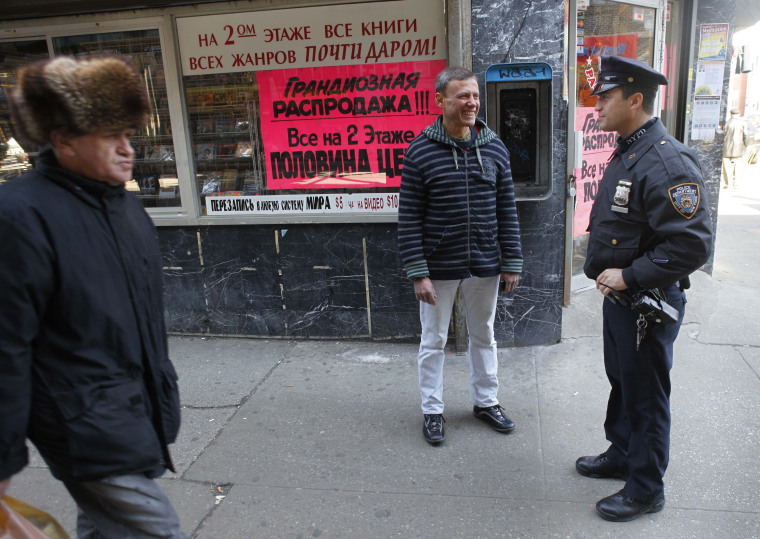Police departments across the country are stepping up efforts to recruit officers who can speak more than one language, in some cases offering raises or even sending cops abroad as part of immersion programs.
Police chiefs hope the investment pays off by improving service to immigrant communities and easing fear of officers in those areas.
"To fight crime you have to be able to communicate," said Susan Shah of the Vera Institute of Justice in New York, which used a federal grant to review the language practices of nearly 200 law enforcement agencies nationwide.
New York Police Commissioner Raymond Kelly has emphasized hiring bilingual officers — especially those fluent in languages spoken in countries with terrorist ties.
"It helps immensely working with the communities in the city, the most diverse city in the world," Kelly said. "We can, in very short order, get someone on the scene who speaks the language."
That's what happened when a detective in Brooklyn heard shouting last week on a bus parked near an Arab-American community.
‘People need to feel they can trust you’
Ahmed Nasser, a native of Yemen, is one of roughly 11,000 members of the NYPD who can speak a second language. He found the bus driver accusing the passenger of not paying the fare and spitting on him.
The passenger, who was from Yemen, had already been handcuffed by a patrolman. He claimed the driver punched him, and his knee was bloodied.
Nasser spoke Arabic with the passenger, who also had a speech impediment. He was eventually let go, and neither he nor the bus driver was charged.
"People need to feel they can trust you," said Nasser, who also translates domestic violence pamphlets into Arabic. "They want to know you're really there and not to spy on you. Once they do, people will open up and talk."
One-third of NYPD employees can speak a second language. Of those, 785 are certified linguists, or expert translators, in 63 languages, including Bengali, Dari, Farsi, Arabic and Urdu. Bilingual officers do everything from intelligence gathering to undercover work to community outreach.
Third-party translators
But New York police do not rely solely on their own officers. Nearly all of the city's 76 precincts and most transit facilities are equipped with a dual-handset phone that can get a third-party translator instantly. The service costs about $1.1 million from now until June 2012, when the contract expires.
In Chicago, the nation's second-largest police force with roughly 13,000 officers, some 3,835 speak additional languages, most commonly Spanish, Polish and German. The department is also in its first year of requiring officers to take a 24-hour Spanish course during their academy training.
The Los Angeles Police Department gives raises to as many as 3,305 officers who become fluent in another language — one-third of the department. And in Dallas, where 358 members speak Spanish and another 20 or so speak Asian languages, officers can earn an extra $150 a month after they become certified that they are fluent in another language.
"We realize we have to expand our skills with the diversity of the city," Senior Cpl. Kevin Janse said.
Recent census data shows more than 20 percent of Americans speak a language other than English and 12 percent are foreign-born. Many smaller cities are also attracting increasing numbers of immigrants. Managing that change is a challenge for law enforcement.
In Lexington, Ky., officers spend a year practicing Spanish and are then sent to Mexico to improve their language skills and learn about the culture. The department's Spanish speakers have increased from two to more than 100, according to the Vera Institute.
Recruitment tough across country
Greg Ridgeway, director of the RAND Center on Quality Policing in Pittsburgh, said recruiting police is a nationwide problem, not only because of hiring cutbacks but because the supply of eligible candidates keeps shrinking.
Police departments are trying to tap into the same pool as federal law enforcement agencies and the armed forces — 25- to 35-year-olds in good shape who have little personal debt that could lure them into corruption.
But, he said, police departments, have achieved considerable success in attracting candidates from ethnic communities, especially newer ones where being an officer is seen as a respectable job.
For many New York officers, their second language is simply part of their culture. Officer Michael Belogorodsky, a native of Ukraine, helped investigate a suspected con artist who had targeted non-English speakers by posing as a travel agent. After speaking in Russian with several alleged suspects, police arrested a 40-year-old man and charged him with stealing more than $26,000 from a dozen people.
"I was fortunate enough to be able to get the information on these victims, contact them myself, jot down the information, keep it all together," said Belogorodsky, national president of the Russian American Officers Association. "When we had enough ... we contacted the district attorney's office."
